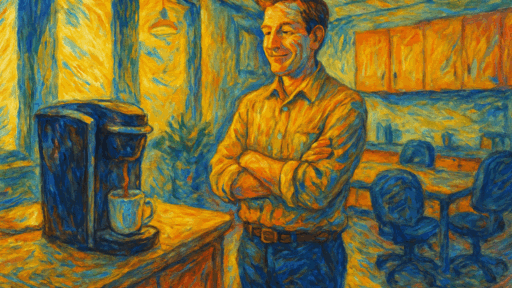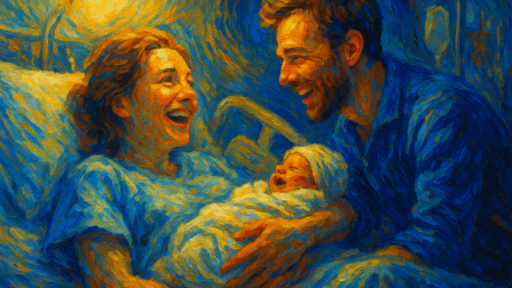“And now that you don’t have to be perfect, you can be good.”
John Steinbeck
When my oldest son was two, we had a Saturday morning ritual that was less a “tradition” and more a “thing we did repeatedly because neither of us knew any better.”
We watched soccer.
Well, I watched soccer.
He watched approximately twelve seconds of it and then sprinted off to rescue imaginary kingdoms from imaginary villains—which, honestly, is not that different from how he exits rooms at sixteen. Growth is not always linear.
Most Saturdays went the same way:
I’d settle into the couch, thinking we might actually watch a match together, and he’d climb up beside me carrying a blanket, a sippy cup, and the wild-eyed excitement of someone who’d been awake for exactly eight minutes.
Then the match would start, and he’d make it maybe one pass, two at best, before spotting something more interesting, like a dust mote or his own foot, and he’d be gone. Just a trail of Cheerios and enthusiasm left in his wake.
But one particular Saturday, instead of a match, the channel served up an infomercial. One of those glossy, impossibly bright fitness programs where everyone smiles like they’ve never once questioned a single life choice. My son took one look, assessed the situation accurately, and toddled off to fight crime.
I stayed.
Not because I wanted to buy anything—but because I found myself caught in that hypnotic, late-night, QVC-but-for-the-soul kind of trance. The kind where a voiceover tells you your best self is only six easy payments away.
When it finally wrapped with the classic line—
“It worked for me. It can work for you.”—
I had that familiar Saturday morning sensation: the sudden, overwhelming urge to reconsider all of my life choices before 9 a.m.
At the time, I chalked it up to normal early-parenthood exhaustion. The kind that makes you reflect on purpose and discipline and identity while your toddler is in the next room narrating an entire imaginary battle with a level of commitment you have not brought to anything in years.
I went through a whole spiral in those days—the kind of quiet, looping self-interrogation only a tired parent can achieve before sunrise:
What am I actually committed to? What do I really care about? Am I becoming the person I say I want to be, or am I just telling myself a very impressive story about it?
Back then, those thoughts felt big.
These days—with a kid who’s somehow taller than me and eats like he’s preparing for hibernation—they hit in a whole other way.
Because here’s what I didn’t understand at the time:
the most important things I was becoming, I wasn’t becoming on purpose.
They were happening quietly. Accidentally, almost. In the middle of the mundane, boring, nothing-special Saturdays I barely noticed.
Back then, I thought “becoming” looked like dramatic choices. Bold declarations. Life-changing epiphanies delivered by men with suspiciously perfect abs.
But the truth is, fatherhood—real, lived-in, decades-long fatherhood—is basically a slow accumulation of small Saturdays. Tiny rituals. Unremarkable mornings. Repetitions you don’t realize are repetitions until you look up and the toddler who couldn’t sit still has become a teenager who sleeps until noon.
I thought the infomercial was the life lesson that day.
But it wasn’t.
The lesson was the two-year-old who came back to the couch halfway through the commercial, climbed into my lap, handed me his blanket like an offering, and leaned his head on my chest for exactly three seconds before remembering he had worlds to save.
I didn’t know it then, but that was the real training program.
The one quietly teaching me patience and presence.
The one shaping me into a man who could sit still, even when life refused to.
The one preparing me for the long, slow work of raising a kid who would someday tower over me and ask for money like I’m the background character who also handles finance in whatever show he thinks we’re in.
Becoming doesn’t feel like becoming when you’re in it.
It feels like clutter on the floor and half-watched matches and the vague suspicion that you are failing at whatever adulthood is supposed to be.
But looking back now, I can see it:
I was becoming a dad in the same way my son was becoming whoever he is now—a little at a time, mostly by accident, shaped by moments that felt too small to matter.
The essential things were happening quietly, just out of sight.
And if you’d asked me then whether I was doing it right, I probably would have pointed at the messy living room, the cold coffee, the abandoned soccer match, and the infomercial still echoing in my brain and said,
“I don’t know. Probably not.”
These days, I’d answer differently.
Because the thing about those invisible moments—the ones you barely register—is that they accumulate. They add up. They turn into something solid enough to stand on.
And one day, without ever signing up for a program or shouting “no excuses” into a camera, you realize you’ve become the person you were quietly becoming all along.
The essential thing wasn’t the message of that infomercial.
It was the tiny boy beside me—
the one I didn’t know I was learning from.
The one who kept wandering off.
And the one who kept coming back.






